Smuggling thrives in face of sanctions on Iran
Government studies payment models to revive trade that stands low at $300m.

The economic sanctions slapped by the United States and European Union on Iran over its alleged nuclear programme are leading to an increase in the flow of smuggled goods, especially petroleum products, to Pakistan and a drop in legal bilateral trade.
Not only this, other bottlenecks, which are the result of some steps taken by the Iranian government, are discouraging trade between the two neighbours.
In an effort to rein in smugglers, Pakistan’s law enforcement agencies have sealed a 500km belt along the border with Iran by digging trenches and placing barbed wires to curb illegal supply of goods to Balochistan. However despite that, the smugglers still find a way to clear the border and dodge security checks.
Among the goods smuggled from Iran, oil has a dominant place for decades. Apart from other means of transportation, mules are used to ship oil canisters from the other side of the border. Small-scale smugglers hire children who carry bottles of fuel and cross into Pakistani territory.
Smuggling is thriving on the back of lower prices of substandard oil, which is sold in Balochistan and southern Punjab.
According to a study conducted by the Ministry of Commerce, the main stumbling block in the way of trade with Iran is payments for goods through banks in the face of international embargo. Officials say banks, which have big trading houses in the US, could see their accounts frozen and also face a ban on property buying there if they process trade transactions with Iran.
Besides the international curbs, Iran is not a signatory of international trading agreements and raises tariff to as high as 200% to protect its industry. “It increases duties during the time when vegetables are produced and supplied by farmers and reduces them in the off season,” a senior government official said. “Iran is following a protectionist policy.”
Officials also argue that Iran has not proved to be a good trading partner as it does not have a centralised decision-making mechanism to strike deals with other countries.
Three or four people are the key decision-makers in the government there and they take major decisions. Even the delegations that come to Pakistan to enter into agreements lack powers to make decisions. Sometimes, they agree on something, but when they return, the decision is reverted.
Tehran also put in place border restrictions that impede the movement of trucks loaded with goods, officials say. It closes the border in the afternoon and goods carriers have to wait to cross into the other side. On the other hand, Pakistan’s border remains open round the clock for bilateral trade.
After crossing the Iranian city of Zahidan, traders have to pay a tax of $1 after every three kilometres. Officials blame these key issues for the decline in bilateral trade to just $300 million per year compared to $1 billion in the past.
Barter trade
Now, the Pakistan government is mulling over taking some measures to remove the hurdles to making payments to Iran. It is studying the cases of India and Turkey, which are trading with Iran and making payments in different modes.
Turkey is paying Iran in the form of precious metals for gas imports as the international sanctions do not allow dealings through banks. On the other hand, India is paying Iran through a local bank that has no branches outside the country.
Though India is continuously importing petroleum products from Iran, the US has kept mum about the trade and has instead piled on the pressure on Pakistan, restraining it from striking any deal. Delhi, however, has assured Washington that it will phase out trade with Iran.
Pakistan has also made some payments through barter trade. There is an understanding in government circles that these modes of payment – barter deals, precious metals like gold or local bank having no branches abroad – should be studied and adopted to step up trade with Iran.
THE WRITER IS A STAFF CORRESPONDENT
Published in The Express Tribune, November 17th, 2014.
Like Business on Facebook, follow @TribuneBiz on Twitter to stay informed and join in the conversation.


















COMMENTS
Comments are moderated and generally will be posted if they are on-topic and not abusive.
For more information, please see our Comments FAQ